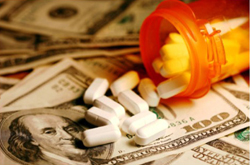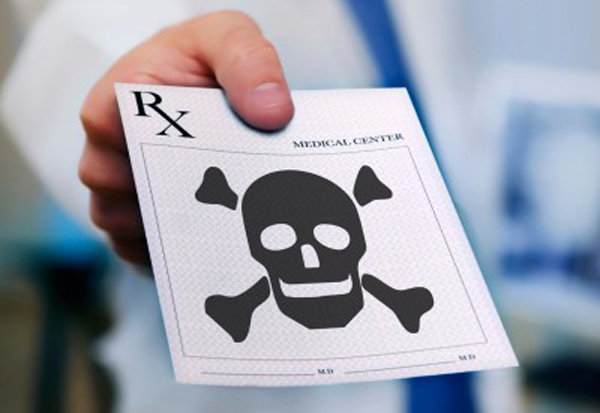By Kelly Patricia O’Meara
September 10, 2015
September 6-12, 2015 is National Suicide Prevention Week and marks the annual push by the mental health community to draw attention to the ever-increasing numbers of suicides occurring each year in the U.S., while concealing information about one of the major factors causing suicide: prescribed psychiatric drugs.
While professing to provide awareness and education about the alleged causes of the deadly epidemic, the information being provided fails to address the singularly important fact that studies show psychiatric drugs prescribed as “treatment” for the mental disorders actually induce suicidality.
The American Foundation for Suicide Prevention (AFSP) explains on its website that “nearly all mental disorders have the potential to increase the risk of suicide” and that 90% of those who die by suicide “had a mental disorder at the time of their deaths.” The AFSP does not provide any data about how many of those “90%” were taking prescribed psychiatric drugs.
Whether psychiatric drugs were prescribed at the time of the suicides is no small matter, especially in light of the fact that the Food and Drug Administration (FDA) has mandated that all antidepressants carry the federal agency’s most serious “black box” warning for suicidality and that the drugs increase the risk of suicidal thinking and behavior in children, adolescents and young adults up to age 24.
Mental health’s missing information also includes:
- A study published in Social Psychiatry and Psychiatric Epidemiology in June 2014 that found psychotropic drugs could make people nearly six times more likely to kill themselves, while having spent time in the previous year in a psychiatric hospital makes them over 44 times more likely to kill themselves.[i]
- In August 2013, the Department of Health and Human Services and the Centers for Medicare and Medicaid Services reported: “Antidepressant medications have been shown to increase the risk of suicidal thinking and behavior. In a pooled-analysis of short-term, placebo-controlled trials of nine antidepressant medications, patients taking an antidepressant had twice the risk of suicidality in the first few months of treatment than those taking placebo. The long-term risk is unknown.”[ii]
-

A closer look is needed into the psychiatric-pharmaceutical industry’s connections to such groups; for example, Pfizer, Solvay Pharmaceuticals and Johnson & Johnson have all had members on AFSP’s board (and Pfizer still does).
Harvard Medical School psychiatrist Joseph Glenmullen says antidepressants could explain the many murder-suicides over the last decade. People who take antidepressants, he said, could “become very distraught…The irritability and impulsivity can make people suicidal or homicidal.”[iii]
- Dr. David Healy, an internationally renowned professor of psychiatry and psychopharmacologist also determined from a review of published SSRI antidepressant clinical trials that the drugs increase the risk of suicide.[iv]
- In a British Medical Journal published study, antidepressants were estimated to cause 10 to 44 deaths out of 1000 people over a year, depending on the type of antidepressant. In comparison, the painkiller Vioxx was taken off the market in the face of evidence that it caused 7 cardiac events out of 1000 people over a year. Paul W. Andrews, assistant professor in the Department of Psychology, Neuroscience & Behavior at McMaster University in Canada, says: “Since cardiac events are not necessarily fatal, the number of deaths estimated to be caused by antidepressants is arguably of much greater concern.”[v]
National Suicide Prevention Week not only fails to take a close look at this issue, it circumvents it, thereby denying those potentially in dire need of help all the information about what could be causing suicidal thoughts.
It also is of interest that the groups, such as AFSP and the American Association of Suicidology, provide an inordinate amount of information about mental disorders and even provide the media with stock press releases about how to best represent the issue, but fail to even mention the possibility that psychiatric drugs could play an integral role in the increased number of suicides.
A closer look is needed into the psychiatric-pharmaceutical industry’s connections to such groups; for example, Pfizer, Solvay Pharmaceuticals and Johnson & Johnson have all had members on AFSP’s board (and Pfizer still does).[vi] Columbia University psychiatrist David Shaffer, inventor of the disgraced TeenScreen depression-screening program (to prevent suicide), is a past president of and currently sits on its scientific board.
The fact is that nearly 80 million Americans now are taking at least one psychiatric drug, including 41 million people taking at least one antidepressant, which includes 7.4 million children between the ages of 6-17. But the drugging of American children has become even more brutal when one considers that more than one million children between the ages of 0-5 are taking psychiatric drugs, including antidepressants, ADHD drugs and antipsychotics.
While the yearly campaign to bring awareness to the nation’s suicide epidemic continues to point the finger at mental disorders as the source, without any unscientific evidence to substantiate this, this leaves in place the very real risk of suicidal behavior that psychiatric drugs are known to cause.
Kelly Patricia O’Meara is an award-winning former investigative reporter for the Washington Times’ Insight Magazine, penning dozens of articles exposing the fraud of psychiatric diagnosis and the dangers of the psychiatric drugs—including her ground-breaking 1999 cover story, “Guns & Doses,” exposing the link between psychiatric drugs and acts of senseless violence. She is also the author of the highly acclaimed book, Psyched Out: How Psychiatry Sells Mental Illness and Pushes Pills that Kill. Prior to working as an investigative journalist, O’Meara spent sixteen years on Capitol Hill as a congressional staffer to four Members of Congress. She holds a B.S. in Political Science from the University of Maryland.
References:
[i] Matthew M. Large, Christopher J. Ryan, “Disturbing findings about the risk of suicide and psychiatric hospitals,” Soc. Psychiatry Psychiatr Epidemiology (2014), 49: 1353-1355.
[ii] “ATYPICAL ANTIPSYCHOTIC MEDICATIONS: USE IN ADULTS,” Dept. Health and Human Services, Centers for Medicare and Medicaid Services, Aug. 2013, p. 4, http://www.cms.gov/Medicare-Medicaid-Coordination/Fraud-Prevention/Medicaid-Integrity-Education/Pharmacy-Education-Materials/Downloads/atyp-antipsych-adult-factsheet.pdf
[iii] “FDA Mulls Antidepressant Warnings,” Daily Press, 21 Mar. 2004.
[iv] David Healy, Graham Aldred, “Antidepressant drug use & the risk of suicide,” International Review of Psychiatry, June 2005, 17 (3), pp.163-172.
[v] Paul Andrews, “Things Your Doctor Should Tell You About Antidepressants,” Mad in America: Science, Psychiatry and Community, 12 Sept. 2012, http://www.madinamerica.com/2012/09/things-your-doctor-should-tell-you-about-antidepressants/
[vi] http://www.afsp.org/index.cfm?page_id=7E69395B-D2D1-CEAC-E5BE2B9CC93F157B; http://www.teenscreentruth.com/Teenscreen_Advisory_Board.htm.; http://www.afsp.org/index.cfm?fuseaction=home.viewPage&page_id=7E68DCA5-9C9E-2C63-FC64DD3F4F0419F2.




SHARE YOUR STORY/COMMENT